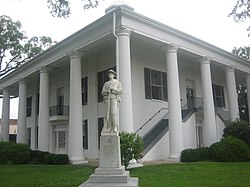Claiborne Parish, Louisiana
| Claiborne Parish, Louisiana | |
|---|---|

The Claiborne Parish Courthouse was built in 1860 in Greek style. It served as a point of departure for Confederate troops.
|
|
 Location in the U.S. state of Louisiana |
|
 Louisiana's location in the U.S. |
|
| Founded | March 13, 1828 |
| Named for | William C. C. Claiborne |
| Seat | Homer |
| Largest town | Homer |
| Area | |
| • Total | 767 sq mi (1,987 km2) |
| • Land | 755 sq mi (1,955 km2) |
| Population (est.) | |
| • (2015) | 16,295 |
| • Density | 23/sq mi (9/km²) |
| Congressional district | 4th |
| Time zone | Central: UTC-6/-5 |
| Website | claiborneparish |
Claiborne Parish (French: Paroisse de Claiborne) is a parish located in the northwestern section of the U.S. state of Louisiana. The parish was formed in 1828, and was named for the first Louisiana governor, William C. C. Claiborne. As of the 2010 census, the population was 17,195. The parish seat is Homer.
John Murrell moved his family from Arkansas to the Flat Lick Bayou area about 6 miles west of present-day Homer in 1818, and they became the first known non-natives to permanently settle in Claiborne Parish. As more settlers moved into the area, the Murrell house served as a church, school and post office. When the state legislature created Claiborne Parish out of in 1828, all governmental business, including court, began being held in the Murrell house. This continued until the new parish's police jury selected Russellville (now a ghost town located northeast of Athens) as the parish seat. As the population began swelling in what was then the western part of the parish, the seat was moved to Overton (another modern ghost town found near Minden) in 1836, because of its position at the head of the navigable portion of Dorcheat Bayou. Due to flooding and health concerns, the parish seat was moved to Athens in 1846, but in 1848 fire destroyed the courthouse and all the records in it. Soon thereafter the Claiborne Police Jury chose the present site for the parish seat, which came to be named, Homer.
John Ardis Cawthon of Louisiana Tech University studied several Claiborne Parish ghost towns in his book of local history, Ghost Towns of Old Claiborne. He recalls the words of a relative, George Washington Dance, "When the courthouse moved, the glory departed. The village is now an old worn-out field."
...
Wikipedia
